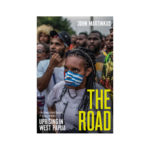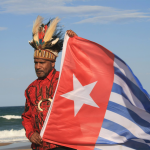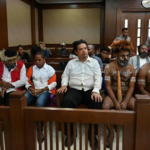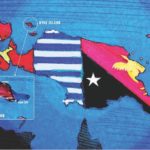West Papuan Provisional Government Formed, as Calls to Allow UN Access Increase
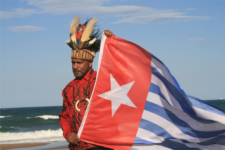
Independence leader Benny Wenda announced the formation of the Provisional Government of West Papua on 1 December 2020.
The government-in-exile has declared Indonesia’s presence in its country an illegal occupation and asserted its right to rule over its own nation.
“We are ready to take over our territory, and we will no longer bow down to Jakarta’s illegal martial rule,” said Wenda. The now president of the provisional government further set out in a statement that the body would “begin implementing our own constitution and reclaiming our sovereign land”.
Wenda subsequently pointed out last week that the new year has already seen fresh repressions in his homeland, which Jakarta designates as two provinces: West Papua and Papua. These have involved the arrests of local West Papuan people due to their support of the new government.
And the president also warned that former head of the Indonesian State Intelligence Agency Abdullah Mahmud Hendropriyono appeared in a recent report calling for 2 million West Papuans – almost the entire population – to be transferred to Manado in the province of North Sulawesi.
Human rights abuses
Meanwhile, on Tuesday, the Netherlands became the 83rd nation to call on Jakarta to allow the UN High Commissioner for Human Rights to enter West Papua to evaluate the situation. These calls have been mounting since late 2019, with the UK throwing its weight behind the campaign in November.
The Office of the High Commissioner issued a statement on 30 November condemning the “escalating violence over the past weeks and months”, which has included the police shooting of a 17-year-old Indigenous man.
The office also warned of an “increased risk of renewed tension and violence”.
The situation in the region has been intensifying since December 2018, when armed independence fighters killed 19 individuals working on the Trans-Papua Highway in the Nduga regency. This led to a massive crackdown by Indonesian forces, causing the displacement of 60,000 villagers.
While widespread and prolonged demonstrations erupted across West Papua in August 2019, after Indonesian police and security forces racially provoked and attacked West Papuan students in the East Javan city of Surabaya.
The Act of No Choice
As former colonial rulers the Netherlands were about to pull out of West Papua in the early 1960s, the United Nations handed over administration of the region to Jakarta on 1 May 1963, after the signing of the 1962 New York Agreement.
As part of the handover, the UN stipulated that Jakarta must hold a referendum to allow the West Papuan people to decide on whether to become an autonomous nation.
The UN-brokered Act of Free Choice eventually took place in 1969. It involved only 1,026 West Papuans, who were handpicked by Indonesia. And under threat of violence, all of them voted to stick with their colonial oppressors.
Over the last 58 years, at least 500,000 West Papuans have lost their lives under Jakarta’s repressive rule, and countless more have been detained as political prisoners.
West Papua remains closed to most of the outside world, with foreign journalists banned, and internet access often being shut down.
Commencing decades ago, a transmigration program has seen an influx of Indonesian migrants from other regions. So, today, West Papuans account for less than 50 percent of the local population, while back in the early 70s, they made up 96 percent of those living in their homelands.
Sovereign people
West Papuan resistance to the ongoing occupation has been increasing of late. Not only has a provisional government been established, but in 2019, the UN High Commissioner was presented with the West Papuan People’s Petition on self-determination, which contains 1.8 million signatures.
President Wenda set out his government’s demands on 7 January. These include permitting the High Commissioner entrance, releasing all political prisoners, ending Indonesia’s martial law and the withdrawal of troops, especially those in regions that have seen recent heavy repressions.
“I am calling on the Indonesian president to fulfil these demands and to find a long-term solution to this issue through an international mechanism,” Wenda made clear.
“To my people, 2021 is the time for every West Papuan to unite and reclaim our sovereignty”.
On our doorstep
Despite the long list of atrocities involved in Indonesia’s genocidal rule in West Papua over the last six decades, our nation does not dispute Jakarta’s claims to the region, which shares the same island and land border with Papua New Guinea.
Indeed, the Australian Federal Police has been involved in the training of 21,000 Indonesian police officers at the Jakarta Centre for Law Enforcement Cooperation, and many of these have gone on to be stationed in West Papua, where they are some of the key perpetrators of atrocities.


